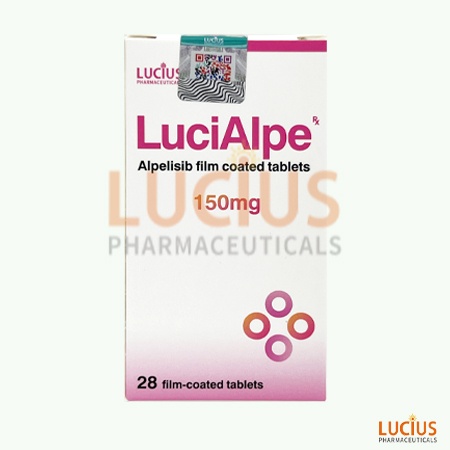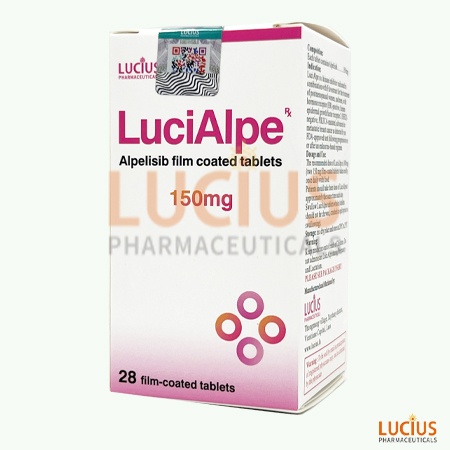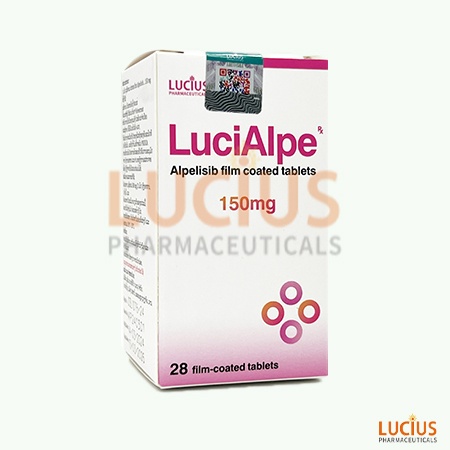





Another Name阿培利司,Piqray,BYL-719,QCR-1,NVP-BYL-719,Pivikto,阿哌利西
IndicationsAlpelisib combined with Fluvastatin in the treatment of postmenopausal women and men with breast cancer.
Reg No.03 L 1076/24
Inspection NO.0386-24


Alpelisib is a phosphatidylinositol 3-kinase (PI3K) inhibitor, specifically targeting the PI3K alpha (PIK3CA) subtype. The drug was initially developed to treat malignant tumors carrying PIK3CA gene mutations, especially breast cancer.
The original pharmaceutical factory of Alpelisib is Novartis, and its FDA listing date is May 25, 2019.
Alpelisib is approved to be used in combination with fluoxetine to treat patients with specific types of advanced or metastatic breast cancer. The establishment of this indication provides a new treatment option for those patients with breast cancer who have poor effects of traditional treatment methods.
Alpelisib
Alpelisib combined with Fluvastatin in the treatment of postmenopausal women and men with breast cancer.
Based on animal data and mechanism of action, Alpelisib can cause fetal harm when administered to a pregnant woman. There are no available data in pregnant women to inform the drug-associated risk. In animal reproduction studies, oral administration of alpelisib to pregnant rats and rabbits during organogenesis caused adverse developmental outcomes, including embryo-fetal mortality (post-implantation loss), reduced fetal weights, and increased incidences of fetal malformations at maternal exposures≥0.8 times the exposure in humans based on AUC at the recommended dose of 300 mg/day. Advise pregnant women and females of reproductive potential of the potential risk to a fetus.
There is no data on the presence of alpelisib in human milk, its effects on milk production, or the breastfed child. Because of the potential for serious adverse reactions in the breastfed child, advise lactating women to not breastfeed during treatment with Alpelisib and for 1 week after the last dose.
Pregnancy Testing
Verify the pregnancy status in females of reproductive potential prior to initiating Alpelisib.
Contraception
Females
Alpelisib can cause fetal harm when administered to a pregnant woman. Advise females of reproductive potential to use effective contraception during treatment with Alpelisib and for 1 week after the last dose.
Males
Advise male patients with female partners of reproductive potential to use condoms and effective contraception during treatment with Alpelisib and for 1 week after the last dose
Infertility
Based on findings from animal studies, Alpelisib may impair fertility in males and females of reproductive potential.
The safety and efficacy of Alpelisib in pediatric patients have not been established.
Of 284 patients who received Alpelisib in the SOLAR-1 trial, 117 patients were ≥ 65 years of age and 34 patients were ≥ 75 years of age. In patients treated with Alpelisib plus fulvestrant, there was a higher incidence of Grade 3-4 hyperglycemia in patients ≥ 65 years of age (44%) compared to patients < 65 years of age (32%). No overall differences in effectiveness of Alpelisib were observed between patients ≥ 65 years of age compared to younger patients. There are an insufficient number of patients ≥ 75 years of age to assess whether there are differences in safety or effectiveness. However, in the SOLAR-1 trial, an increase in the hyperglycemia adverse reactions (74% vs 66%) and Grade 3-4 (56% vs 36%) hyperglycemia were observed in patients ≥ 75 years of age compared to patients < 75 years of age, respectively.
The effect of severe renal impairment (CLcr < 30 mL/min) on alpelisib pharmacokinetics is unknown.
No dose adjustment is recommended for patients with mild to moderate renal impairment (CLcr 30 to < 90 mL/min).
There is limited experience of overdose with Alpelisib in clinical trials. In the clinical studies, Alpelisib was administered at doses up to 450 mg once daily.
In cases where accidental overdosage of Alpelisib was reported in the clinical studies, the adverse reactions associated with the overdose were consistent with the known safety profile of Alpelisib and included hyperglycemia, nausea, asthenia, and rash.
Initiate general symptomatic and supportive measures in all cases of overdosage where necessary. There is no known antidote for Alpelisib.
Store at 20°C to 25°C (68°F to 77°F), excursions permitted between 15°C and 30°C (59°F and 86°F)
The median time to reach peak plasma concentration (Tmax) ranged between 2.0 to 4.0 hours.
from FDA,2022.11